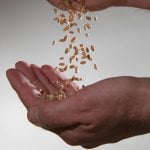Europe’s biodiesel industry, which had been racing along the autobahn at blinding speeds, has suddenly hit gridlock.
Production of the alternative fuel had been growing at a furious clip until this year when demand began to taper off because of lost subsidies and competition from cheap imports.
“Production may start stagnating if not declining … if urgent action is not taken,” said the European Biodiesel Board (EBB) in a News release
Read Also

U.S. loses out on sales of soybean to China
U.S. soybean exporters risk missing out on billions of dollars worth of sales to China this year as trade talks drag on and buyers in the top oilseed importer lock in cargoes from Brazil.
news issued this summer.
In 2006, production of biodiesel from the 27 countries that comprise the European Union amounted to 4.9 million tonnes, a 54 percent increase from 2005 levels.
Germany is by far the largest producer, pumping out 2.7 million tonnes in 2006. The next largest supplier was France at 743,000 tonnes.
But new tax policies adopted by Germany in January have biodiesel proponents forecasting that their industry will collapse.
Instead of being exempt from the 65 cents per litre state fuel tax, German biodiesel manufacturers were forced to pay 13 cents per litre starting in 2007, an amount that will rise to the full 65 cents by 2012, with the next hike scheduled for January 2008.
As a result, Germany’s two main biodiesel associations say the industry is now limping along at about 40 percent capacity and once the next phase of tax relief withdrawal takes effect in 2008, many plants will close.
That would be a big blow to the European biodiesel industry and rapeseed producers, who provide the raw material for 80 percent of the region’s biodiesel production. It would also cut into Canadian canola oil and seed exports, which have been relied upon to top up local production that has been in short supply during the industry’s previous unprecedented growth.
Germany’s tax measures are not the only speed bump on the biodiesel highway. At last count, Europe has 185 operational biodiesel plants and 58 under construction.
Capacity is 10.2 million tonnes but many plants are producing at a fraction of their capability because important member states such as Italy, Spain and Poland are only paying lip service to the EU’s biofuel targets.
The European Commission has set a target of 5.75 percent of biofuel in transportation fuel by 2010 and a minimum target of 10 percent in all member states by 2020.
A biofuels progress report released by the commission in 2007 concluded the 2010 target will not be reached, with incorporation rates topping out between 2.4 and 4.2 percent.
Compounding the problems are B99 biodiesel imports, produced under a heavily subsidized program in the United States. The fuel is imported at a price equal to or lower than the cost of the raw materials used by the EU’s biodiesel industry.
“Mostly due to the negative impact of B99 exports, EU biodiesel production is expected to stagnate in the year 2007, in spite of the 50-60 percent growth of the last two years,” the EBB said in a July 17 news release.
Detlef Volz, general manager of C. Thywissen GmbH, which owns part of a large biodiesel plant in Marl, Germany, said unfair competition from oversubsidized U.S. product is one of the main reasons the company’s 240,000 tonne per year plant isn’t operating at full capacity.
The imports include cheap South American biodiesel that was stopping over in the U.S. on the way to Europe to collect lucrative subsidies under the B99 program. U.S. officials have vowed to crack down on that practice but European manufacturers will still be competing with American fuel that receives a subsidy of $339 per tonne.
The industry estimates 500,000 to 600,000 tonnes of cheap U.S. biodiesel are getting into Germany annually. The EEB is preparing a countervailing duty complaint in an attempt to reduce the flow.
Despite all the constraints, particularly in Germany, where biodiesel demand is projected to drop dramatically in 2008, Volz considers it a temporary setback for the European biodiesel sector.
Demand for the fuel is growing rapidly in France, where the government has taken a different tack, adopting a quota-based mandate that prevents competition from subsidized exports.
“Basically the whole thing is working fine,” Volz said.
“We just probably went too fast in Germany and now we have a setback.”


















